Topical questionspublished at 14:04 BST 25 October 2016
MSPs will now quiz Scottish government ministers during topical questions.
The Justice Committee looked into the role of the Crown Office and Procurator Fiscal Service
Justice Secretary Michael Matheson announces move to pardon men who were convicted of same-sex offences before laws against homosexuality were scrapped, during topical questions
The Scottish government led a debate entitled ‘Building a Fairer Scotland – It takes all of us’
The member’s debate focused on the volunteers who keep our train stations clean and lovely, by adopting a station
Craig Hutchison and Colin Bell
MSPs will now quiz Scottish government ministers during topical questions.
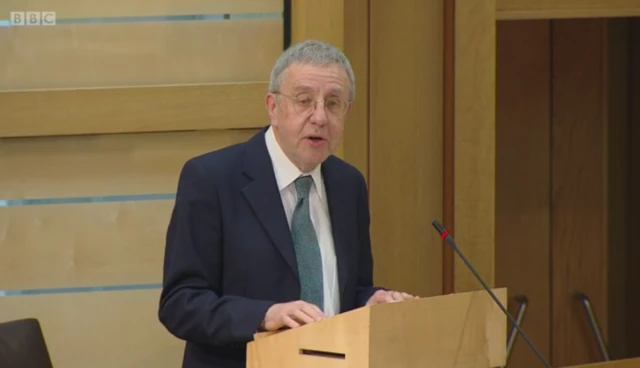
Professor Alan Spence, author and member of the Sri Chinmoy Centre
Professor Alan Spence, author and member of the Sri Chinmoy Centre, delivers today's time for reflection.
Topical questions sees questions on minimum pricing of alcohol , a call for the convictions issued to people for now-abolished gay sexual offences to be quashed and the level of support for independence.
 Image source, PA / Getty / BBC
Image source, PA / Getty / BBCMinimum pricing, Alan Turing and independence support will feature in topical questions.
The Scottish government will then lead a debate entitled ‘Building a Fairer Scotland – It takes all of us’.
The member’s debate focuses on the volunteers who keep our train stations clean and lovely, by adopting a station.
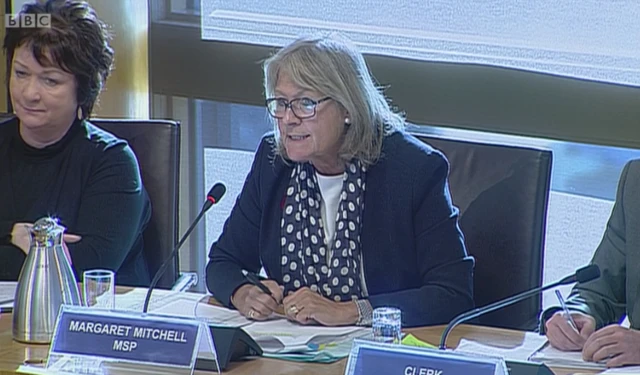
Committee Convener Margaret Mitchell
That concludes the COPFS evidence sessions.
Michael Clancy from the Law Society of Scotland says internet poverty is critical.
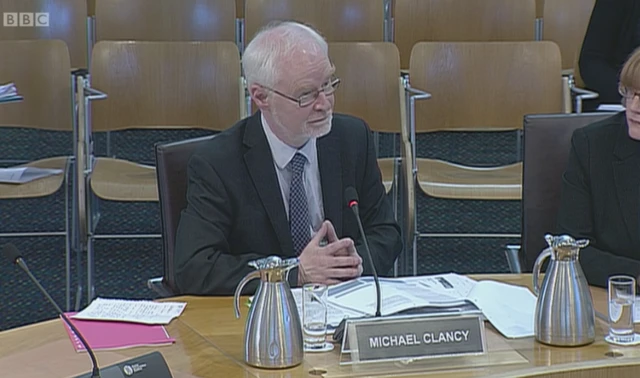
Mr Clancy says engaging victims and witnesses will require the application of technology.
He says there will be a high use of technology by those in the justice system and for those whose engagement is more periodic, "we need to up the game".
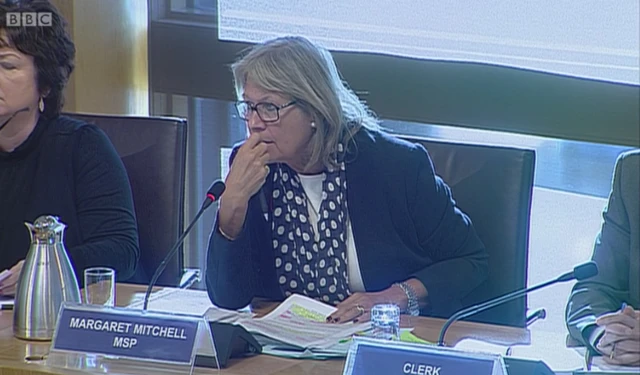
Committee Convener Margaret Mitchell
Committee Convener Margaret Mitchell says this evidence session is so important she wants it to run on past midday.
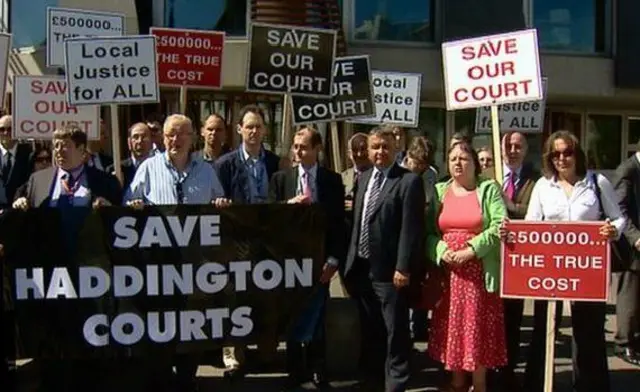 Image source, bbc
Image source, bbcCampaigners failed to save Haddington Sheriff Court
Stephen Mannifield from the Edinburgh Bar Association says the closure of Haddington Sheriff Court has had a "massive impact".
Mr Mannifield says Edinburgh Sheriff Court is now dealing with all the more serious cases for Edinburgh and East Lothian since the closure of Haddington.
He says overloading of trials courts is a problem.
Liam McAllister from Aberdeen Bar Association also highlights the impact of the closure of Stonehaven.
Stephen Mannifield, President, Edinburgh Bar Association says the switchboard is a barrier to getting through to a depute fiscal.
Mr Mannifeild says the hotline does not seem to serve any purpose.
 Image source, bbc
Image source, bbcBar associations complain about centralisation of communication
In the submission from the Glasgow Bar Association it says:
Liam McAllister from the Aberdeen Bar Association agrees and says centralisation of communication does not work.
He says procurator fiscals want to interact with defence lawyers.
Stephen Mannifield from the Edinburgh Bar Association says a 70-year-old man with no previous convictions and no history of call-outs may be overheard having an argument with his wife by neighbours and if the police are called and come out it will be classed as a domestic incident.

Mr Mannifield says that the policy is that the man will be arrested and if it is a Friday night he will spend the weekend behind bars before appearing in court.
He says, someone with a history of domestic violence may get arrested on Glasgow on a Friday night after a violent altercation and the police may release that person under caution.
He says the problems with "rigid policies" is that they apply to everyone no matter their background.
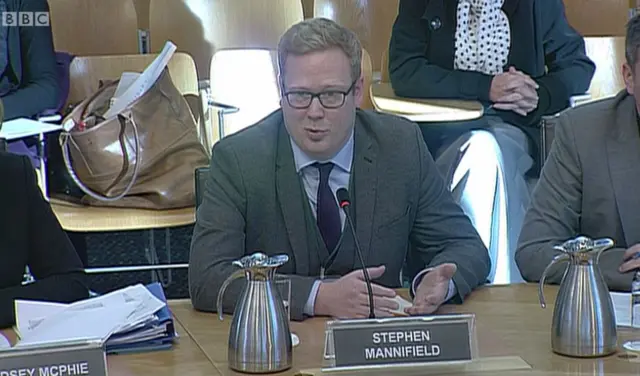 Image source, bbc
Image source, bbcStephen Mannifield from the Edinburgh Bar Association
Stephen Mannifield from the Edinburgh Bar Association says the lack of resource facing the COPFS is key.
Mr Mannifield says trial delays, due to some witnesses not being cited, can lead to the end of prosecutions.
Allow X content?
This article contains content provided by X. We ask for your permission before anything is loaded, as they may be using cookies and other technologies. You may want to read X’s cookie policy, external and privacy policy, external before accepting. To view this content choose ‘accept and continue’.
Allow X content?
This article contains content provided by X. We ask for your permission before anything is loaded, as they may be using cookies and other technologies. You may want to read X’s cookie policy, external and privacy policy, external before accepting. To view this content choose ‘accept and continue’.
Allow X content?
This article contains content provided by X. We ask for your permission before anything is loaded, as they may be using cookies and other technologies. You may want to read X’s cookie policy, external and privacy policy, external before accepting. To view this content choose ‘accept and continue’.
Michael Clancy from Law Society of Scotland highlights issues being raised by experts, with one saying there is an "incipient crisis".
Stephen Mannifield says there is a set fee for getting a medical report from an accused's GP.
Mr Mannifield says it is becoming increasingly common for GPs to refuse to do it for that fee.
Stephen Mannifield from the Edinburgh Bar Association says it is always a question of finite resources.
Mr Mannifield says there is a good quality of prosecutors across Scotland but they must be allowed to do their jobs to the fullest.
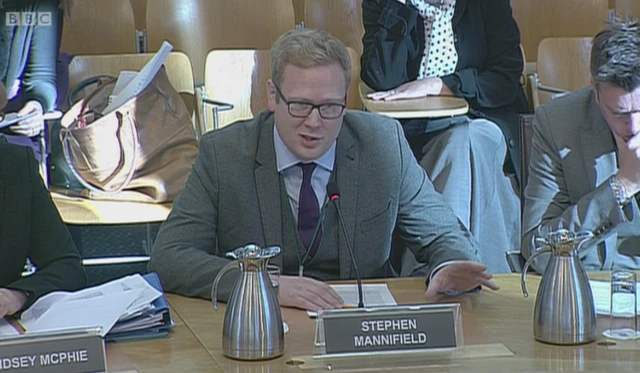
Stephen Mannifield from the Edinburgh Bar Association
Michael Clancy, Director of Law Reform, Law Society of Scotland says the procurator fiscal deputes are dedicated individuals who work hard.
Mr Clancy says there are 88,000 cases prosecuted each year in the Sheriff Court with a fall in budget.
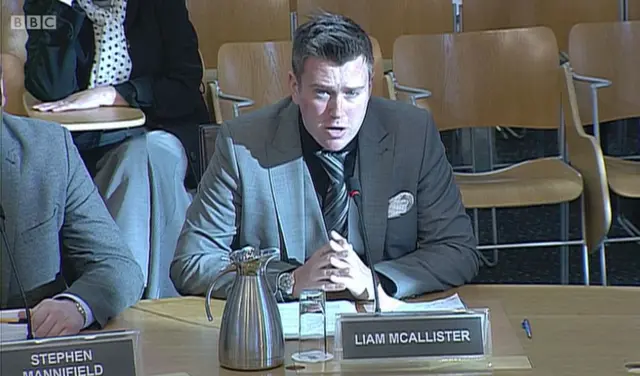 Image source, bbc
Image source, bbcLiam McAllister from the Aberdeen Bar Association
Liam McAllister from the Aberdeen Bar Association says the fundamental point for an effective COPFS is for the discretion of deputes to be allowed to channel their intellect and critical skill.
This in a court where there is sometimes a fearsome judge breathing down their neck.
Mr McAllister says young lawyers are often thrown into courts.
Linsey McPhie from the Glasgow Bar Association says it is extremely concerning that standard summary cases are being badly impacted upon by a lack of resources.
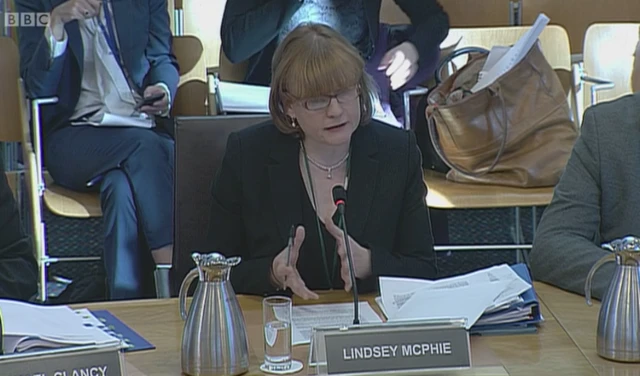
Ms McPhie says caseworkers are trying to deal with a number of complex and difficult cases at the one time.
She says these cases can involve a number of complexities such as child witnesses and these difficulties are being overlooked at the moment.
Committee Convener Margaret Mitchell gets the second evidence session underway: Liam McAllister, President, Aberdeen Bar Association;
Allow X content?
This article contains content provided by X. We ask for your permission before anything is loaded, as they may be using cookies and other technologies. You may want to read X’s cookie policy, external and privacy policy, external before accepting. To view this content choose ‘accept and continue’.
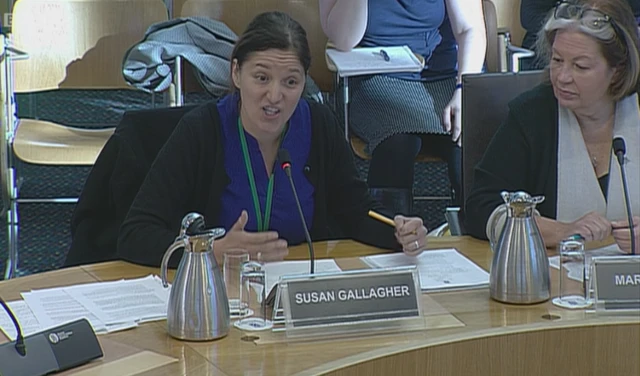
Susan Gallagher from Victim Support Scotland says precognition helps victims give evidence and when they have spoken to no-one before giving evidence some are "terrified".
Ms Gallagher says the lack of precognition is about resource and the volume of cases coming in now.